Sunday Feb 22, 2026
Sunday Feb 22, 2026
Friday, 26 September 2025 00:00 - - {{hitsCtrl.values.hits}}
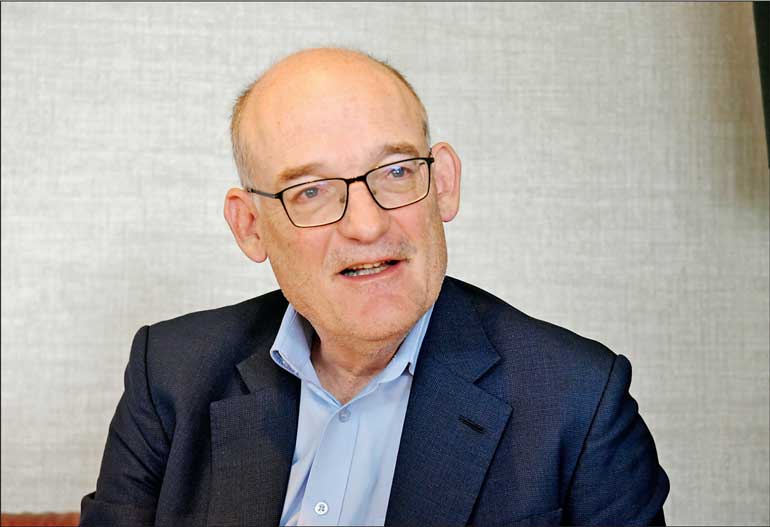
Cambridge International Education Group MD Rod Smith
Cambridge University Press & Assessment reaffirmed its commitment to learners and educators in Sri Lanka last week, announcing a stronger regional presence and a renewed strategic focus as part of its long-term vision for the country’s learning education landscape. During his brief visit to Colombo last week, Cambridge International Education Managing Director Rod Smith, in an exclusive interview with the Daily FT, underscored Cambridge’s enduring commitment to Sri Lanka.
Before taking over as the Group Managing Director of International Education, Smith was previously the Global Managing Director for Education at Cambridge University Press. “I grew up with the deep belief that great education needs to be available to as many people as possible,” says Smith who grew up in and around schools with an educator-mother.
Smith’s career has validated his strong belief that education is the key to driving sustainable change for good in society and creating opportunities for more young people to be active beneficiaries of that change. Having briefly served as a primary school teacher, Smith developed his career in education services. For over 30 years he has worked in publishing, qualifications – both international and vocational and Ed Tech companies in diverse marketing and general management roles.
Following are the excerpts from his interview with the Daily FT:
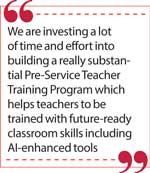 By Randima Attygalle
By Randima Attygalle
Q: In a landscape with rapid changes in international education, how does Cambridge aspire to translate such changes/advancements to the Sri Lankan setting?
A: International education is growing around the world at quite significant rates and has been so for a number of years. There are around 10,000 Cambridge schools world-wide and 60 plus schools in Sri Lanka. This means Sri Lanka is part of a vibrant and a wide community of Cambridge schools from which the country can benefit. We believe that there are many more schools that would benefit from wanting to be part of the Cambridge community, which is the biggest international education provider in the world right now. We’re really keen to be more visible, giving schools the opportunity here to think about joining the world’s largest international education community. We’ve just appointed our new country manager for Sri Lanka and we’ve got a really exciting plan ahead.
Q: Is it also understood that Cambridge envisions to establish a legal entity in Sri Lanka. Can you throw light on this and explain how this could forge a stronger presence in the country and strengthen collaborations?
A: Within the next six months we hope to complete setting up of the legal entity in Sri Lanka which is a sign of our commitment to the country in terms of long-term investment and enabling closer collaborations with schools and partner institutions to address local needs.
The legal entity is promised to make a big difference enabling Cambridge to provide better services to schools in Sri Lanka. It will help us attract and recruit more staff with a business that’s actually based here. Going ahead, we will be able to develop specific solutions for Sri Lanka, including the ability to pay in local currency, for instance. This local entity will also enable more flexibly about the way we work with our Sri Lankan counterparts.
 Q: Cambridge University Press & Assessment recently reaffirmed its commitment to learners and educators in Sri Lanka, announcing a stronger regional presence and a renewed strategic focus. Could you please elaborate on this?
Q: Cambridge University Press & Assessment recently reaffirmed its commitment to learners and educators in Sri Lanka, announcing a stronger regional presence and a renewed strategic focus. Could you please elaborate on this?
A: We believe in curricula and qualifications that are globally recognised. One of the greatest strengths of the Cambridge curriculum is that its A-level qualification is recognised by over 2,500 universities around the world. Students with Cambridge qualifications travel the world or travel regionally to progress. But what we’re increasingly seeing is that, whilst you’ve got the international relevance, it’s really important to have local context as well. Therefore, we’re working around more and more products and services which are internationally recognised and at the same time relevant to South Asia. Our mantra therefore is- international as necessary, but as local as possible.
One of the big things we come across time and time again here is enterprise, the need to develop enterprise-innovation in young people, those skills that are going to equip them to be ready for the world. Sri Lanka itself as a country is comprehending its role within the region in this aspect, how to position the country around being a centre for business and innovation and investment. Therefore, these skills around innovation and enterprise are incredibly important to build into the curriculum.
This year we launched our ‘Young Pioneers’ program in South Asia, which is all about enterprise and innovation. And we will be extending this program to Sri Lanka as well. Last year we launched ‘Climate Quest’, our free climate skills program which goes alongside our curriculum to develop understanding of the climate crisis, which will affect the South Asian region significantly, including Sri Lanka. We have already launched the program in India and soon we’re going to bring it to Sri Lanka.
We’ve been doing a lot of work focusing on teacher-development as well. We understand that one of the biggest challenges in South Asia generally is the shortage of teachers to be able to deliver the international curriculum. So, we are launching pre-service programs and teacher development support programs to overcome this issue.
Q: Sri Lanka is a country with a population which believes that education is a ticket to great things in life. How does this thinking complement in supporting new ventures of Cambridge?
A: I fully endorse the same because Sri Lanka is the second largest transnational education (TNE) partner for the UK-based universities. During my visit to the island, I had the opportunity of meeting the Prime Minister and had a very interesting conversation about her aspirations for education in the country which are also indicative of building on those foundations of deep belief and faith in education and making education opportunities available even more broadly.
Cambridge works 40 plus governments around the world and there are over 10,000 schools that are following the Cambridge curriculum. We believe that we’ve got a really strong role to play in Sri Lanka’s ambition for continuing to improve its narrative on education offering.
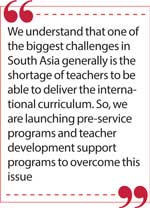 Q: In terms of the Cambridge curriculum available in Sri Lanka, what changes can we expect in near future?
Q: In terms of the Cambridge curriculum available in Sri Lanka, what changes can we expect in near future?
A: With our choice of 55 subjects at A-level and 70 subjects at IGCSE, it is already probably the broadest range of options and qualifications available to a student. Nevertheless, we’re looking all the time at bringing out new things to reinvigorate the curriculum. I think it’s important that the curriculum is always adapting to the world around.
Q: Can you throw light on the key findings of the recently launched Future-Ready Learners Report?
A: The report examines the skills required by future-ready learners to adapt to a fast-changing world and the challenges in developing those skills. This report which is intended for educators, policymakers, and institutions shaping future-ready learning, draws on surveys of more than 3,000 teachers and nearly 4,000 students across 150 countries. In response to the study, Cambridge identifies five priorities for action: raising student awareness of skill development, reframing subject knowledge as a foundation for skills, fostering self-management, strengthening oracy, and recognising schools as safe spaces for practicing communication.
The report also signals that the skills that young people have developed historically in their education are no longer enough for a world which is rapidly changing. For example, both learners and teachers recognise the potential of digital technologies to enhance learning, while also highlighting concerns about distraction and the impact on critical thinking and communication skills.
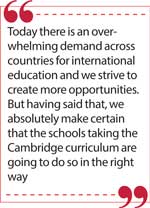 Q: What has Cambridge got in store to enhance teacher-capacity for better classroom outcomes?
Q: What has Cambridge got in store to enhance teacher-capacity for better classroom outcomes?
A: Amidst all changes and challenges in education, the teacher remains fundamental to the success of education. We firmly believe that the best environment for learning is within a school with a great teacher. Right now, there is a global shortage of 44 million teachers around the world. So, what can we do to address this dilemma? We are investing a lot of time and effort into building a really substantial Pre-Service Teacher Training Program which helps teachers to be trained with future-ready classroom skills including AI-enhanced tools. We launched our first Cambridge Pre-service Teacher Training Program (CPTTP) in South Asia together with Vishwakarma University, Pune in February this year and we are in the process of reaching out to partners across the region to replicate this model in their respective countries including Sri Lanka.
Q: In a digitally-advanced world, will Cambridge be rolling out any special programs to equip teachers and teacher-trainers with digital tools required for modern teaching?
A: AI needs to be thought about as a really powerful tool that can improve education. But there’s a danger that, if it’s not used well, it becomes disempowering, in fact, that has the opposite impact. We’re doing a lot of work at the moment on, ‘what does great teaching that’s empowered by AI look like’. We published just recently our guide to using AI effectively in the classroom. We’re also doing a lot around productivity. Actually, AI could really significantly help teachers’ productivity, with lesson planning, assessment, and even personalising elements of teaching in their classrooms. We do see AI as hugely valuable for supporting teachers in what is usually a kind of incredibly busy job that entails many demands on them.
AI is going to help with the potential to personalise the curriculum for different students, not just by what they know, but by their different learning styles and their different interests. And we also see that, AI has got the ability to actually support deep learning, not bypass it, but only if you have teachers who are trained in the effective use of it and the ethical use of it as well, because of course it has issues to do with the ethics of learning and sustainability as well. Teachers need to take stock of all these things and we’re launching a whole series of events and programs at the moment to support teachers on that.
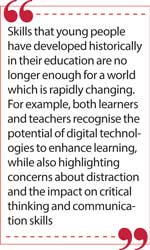 Q: How does Cambridge strike a balance between expanding the reach to students outside the main cities where historically Cambridge schools have been popular and maintaining Cambridge standards?
Q: How does Cambridge strike a balance between expanding the reach to students outside the main cities where historically Cambridge schools have been popular and maintaining Cambridge standards?
A: To be recognised as a ‘Cambridge School’, each institution needs to follow certain regulations because every year we receive a massive number of applications. Be it a large school or a small school regardless the locality, the standards expected of it will be the same.
The great strength of Cambridge is the fact that it is trusted by 2,500 universities around the world. It is certainly not about just the proliferation of as many schools taking the Cambridge curriculum, but we are very conscious about our brand, our reputation and the trust. It is all about ensuring that good schools are delivering a good curriculum and that young learners are coming out with a really great love of learning and deep understanding of learning. We put a lot of time and a lot of effort both in helping schools get up to that standard. We’re not just saying, we want to raise the bar high, but we want to help more schools to be ready for that.
Every year we close down hundreds of schools around the world that are not delivering what ought to be delivered, adhering to the Cambridge standards. And we have a team of 50 plus people in Cambridge and many more people locally, who are visiting schools regularly. Because for us, bad schools running a Cambridge curriculum is the worst thing that could happen. But at the same time, we are also keen that more young people get access to the Cambridge curriculum. Today there is an overwhelming demand across countries for international education and we strive to create more opportunities. But having said that, we absolutely make certain that the schools taking the Cambridge curriculum are going to do so in the right way.
Q: Finally, having grown up in and around schools, how did this background of yours fuel your commitment towards education?
A: “My mother was a school-owner and head teacher for 35 years. She was the youngest of seven daughters and the first to go to university in post-war England. She built a real successful business around education and was very passionate about it. I grew up with the deep belief that great education needs to be available to as many people as possible. Today, at Cambridge which is fundamentally a not-for-profit organisation with a mission to do great things in education and research around the world, I’m surrounded by colleagues who are similarly motivated by education and will go the extra mile to think about every learner.
- Pic by Shehan Gunasekera